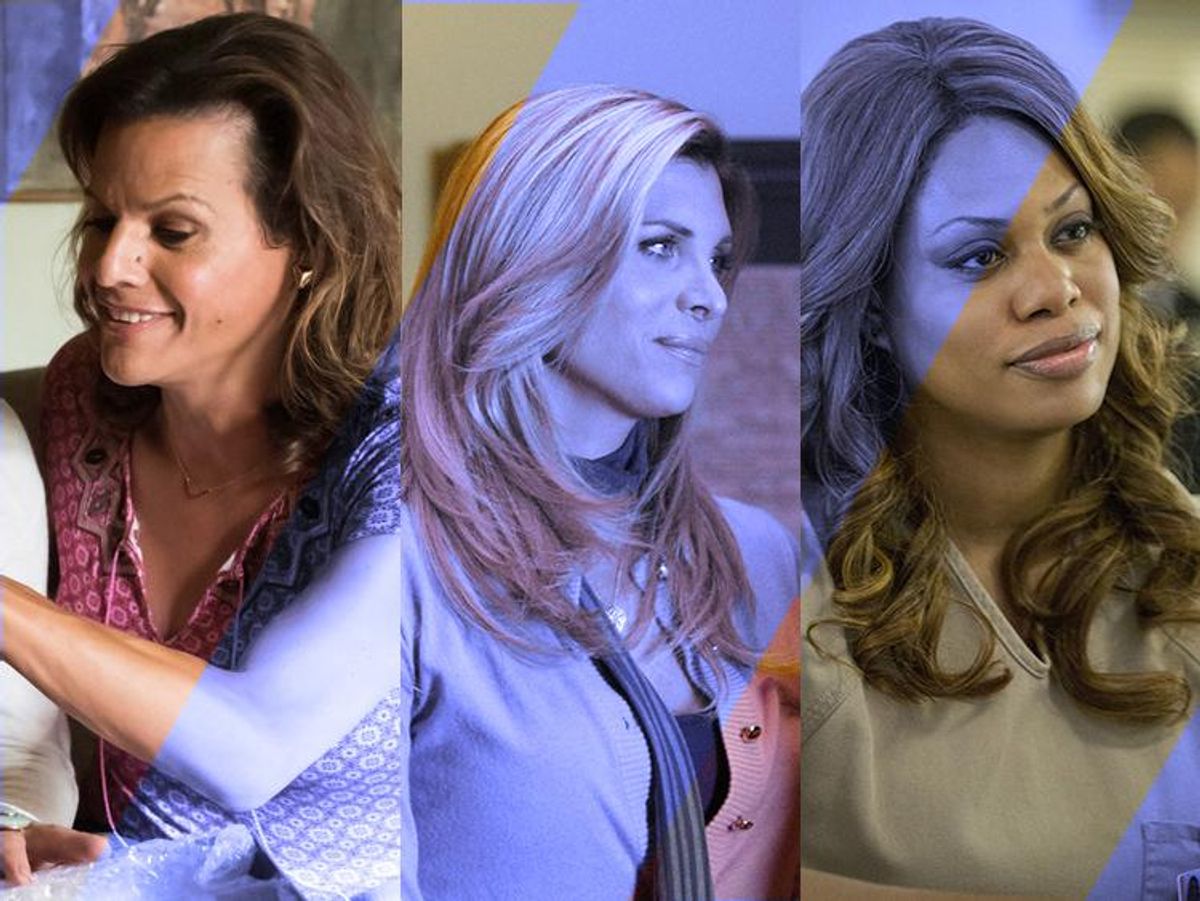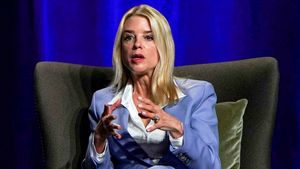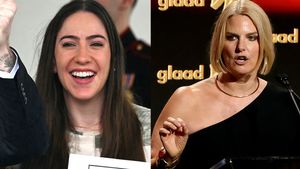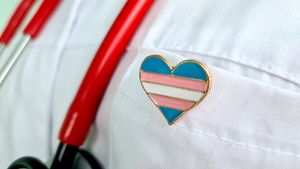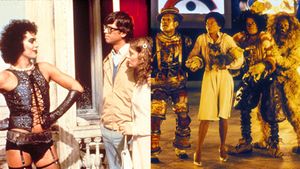In our current golden era of TV, storytelling is the most progressive that audiences have seen with almost all members of the LGBT community finding representation on screen--most recently, the "T." Yet, with shows likeTransparent and Orange Is the New Blackreceiving mainstream accolades--the Amazon series taking home five Primetime Emmys and OITNB's Laverne Cox earning the first Emmy nomination for a transgender actor--it's easy to ignore the decades of negative transgender portrayals that came before it.
For decades, to be transgender on TV meant being a pariah paraded around on talk shows, a victim of a hate crime, or a punch line. Unfortunately, it also meant being a joke. It wasn't until the mid-2000s that the first cracks were made in the transgender glass ceiling. Finally, transgender characters were being portrayed by transgender actors--and the stories slowly moved beyond a tertiary perspective.
Now, in 2015 with Caitlyn Jenner becoming the most high-profile transgender personality and Laverne Cox and others leading the so-called "transgender tipping point," audiences are seeing varied, inclusive storytelling on scripted series. But as Cox and the many pioneers before her will explain, there's still a lot of ignorance to overcome.
* * * *

In the 1980s and '90s, there was almost a complete lack of any realistic representation of the trans experience on TV. Most of it was seen in film, with movies--Ma Vie en Rose (My Life in Pink), Silence of the Lambs, The Crying Game, and Boys Don't Cry--offering both positive and negative portrayals. What little representation did exist didn't really offer an accurate look at what the community was experiencing in real life. Compounding the gap was also the lack of vocabulary to define what it meant to be transgender.
Alexandra Billings, Transparent: Television when I was young was all fantasy shows. They were still calling Paul Lynde flamboyant. I remember us being a punch line: Billy Crystal dressing in drag, Milton Berle popping up on Laugh-In, and things like that.
Candis Cayne, Dirty Sexy Money: At some point in the '90s, there was a show on MTV with Codie Leone, The Art School Girls of Doom. They were trans, but I don't even know if they knew they were trans.
Our Lady J, Transparent: In the late-'90s, I would watch The RuPaul Show, and she was so ambiguous about her gender that it allowed me to see myself a little in her gender non-conformity. I didn't know if that was trans or drag or what that was. But I knew that it was somewhere under the umbrella.
Billings: I didn't really have any vocabulary for who or what I was at the time. It wasn't like I was saying, "Ooh, I was saw people like me." I just knew that I was different.
Zackary Drucker, Transparent: It was over my head as a young person, but there was Silence of the Lambs with Buffalo Bill as a version of a trans person.
Cayne: It was the only time you heard of trans--and that was never discussed. It was just a freak show.
Erika Ervin, American Horror Story: Freak Show: I first saw [James Bond actress] Caroline Cossey when I was 14. It was almost scary, because I had to admit things to myself.
Billings: I was 16 or 17, living in Illinois. I really thought at that point that everyone would be better off without me on the planet. I was creating a lot of problems, and I was sad a lot. I was terribly confused and very angry. I was secretly dressing up. I don't know why, but I knew it was shameful. I remember it was a late afternoon on a Friday, my parents were at work and the house was empty. I got a big fistful of pills from my mom's medicine cabinet and I thought, This is what I'm going to do. So I went into my room, and I turned on the television, which I did automatically because I'm a TV baby. On came Phil Donahue and on his show were these four fabulous looking, what I assumed were strippers, and they were eloquent and funny and witty and happy. I thought, Those were some happy strippers. Then I remember the audience asking the strangest questions like, 'Which bathroom do you use?' I'm sitting there on the edge of my bed with a handful of pills and as the show went on, I found out those four women were actually four men. That was an epiphany for me. I sat there and I thought, There I am. That was the first time I had actually seen myself. Then I started having vocabulary for who I was. That was the beginning of a brand new freedom. That's when I transitioned.
Drucker: Trans people in the 1990s were mostly present in TV talk shows, which were usually sensationalized narratives. It was amazing to see those people--real-life people from different parts of America--even if they were in a context that was arcane and antiquated.
Geena Rocero,Beautiful as I Want to Be: For the longest time, we were always fighting how media was representing trans characters, which is the Jerry Springer way. It was all about transition, it was all about the surgery.
Jen Richards, Her Story: That's where we saw trans women the most. It was always so ugly and such a spectacle for the crowd.
Scott Turner Schofield, The Bold and the Beautiful: There really wasn't female-to-male representation and there still isn't. Chaz Bono came out and did his thing. Everything else focused on transgender women--which is great--but in terms of seeing myself reflected anywhere, it's been very few and far between.
Cayne: I didn't think it was possible to see representation on TV. I was in the industry truly because I love what I was doing, and I kept working toward it. I didn't ever miss it because it never happened before.
Richards: Prior to the visibility that came just a few years ago, I never thought it was possible to have trans representation on TV.
* * * *

By 2001, transgender characters started to appear on TV--but almost always as some sort of victim. In 2012, GLAAD released a report detailing 102 instances of transgender representation on scripted television going back to 2002. Of those roles and storylines, 54 percent contained negative portrayals with trans characters playing victims, killers, or sex workers.
Drucker: There's a long history of trans narratives that we need to undo and correct. I am friends with both Alexandra Billings and Candis Cayne, and it's mindboggling to hear their stories of what the landscape was like back then, how they were treated at auditions. Candis couldn't get an agent or a manager.
Billings: They were auditioning trans people for a role on Curb Your Enthusiasm. It was something like a trans female going to a restaurant and there's a long line for the ladies room and she decides to go into the men's room to go to the bathroom. She meets the star of the show and comedy ensues. Candis was there. We arrived at the same time and we looked, there was this sheet of paper and it said the scenario. I looked at her and I said, "I'm not doing this." And she said, "I'm not doing it either." We both got on our phones, we both called our agents. Mine was like, "Yeah, don't do it." He was like, "Go to lunch with Candis." I turned to Candis and said, "You know what we should do? We should go into the audition and say something." And she said, "You're absolutely right." I don't remember if it was my idea or not, but one of us said it. That's what we did.
Cayne: I definitely went in front of the producers and said, "I'm sorry this would never happen," but hoping they would say, "How can we fix it?" But there was no way of doing that. I said, "I'm sorry I can't do this, so I'm going to have to leave, but I love the show," and then I walked out.
Billings: I said, "Guys, I need to tell you. This is really insulting. Comedy comes from truth and this is something that would never happen. What you're doing is making us the punch line, and I won't be a part of it." I remember the producers said, "I guess this isn't the role for you." And I said, "Well, it's not the show either."
Cayne: On an episode of CSI I did early on, I talked to the producers and the writers about how to make the character more realistic. You know, not dying in the men's room but dying in the women's room, not standing at the urinal or in the stall. If I'm going to get murdered with my head stuffed in a toilet and drowned--which is disgusting, but it's television--at least make it an accurate portrayal.
Laverne Cox, Orange Is the New Black: It's funny because I talked to a friend of mine who didn't audition for the prostitute part on Bored to Death and was like, "Oh blah blah blah, that's not a role for me." Because of my training and because of my background, I've never assumed that just because someone does sex work that she's not a human being. Obviously the narrative has to have room for humanizing moments of the character. I'd have to be able to find those, and I can't do it by myself. The story has to support that. The director has to be interested in that.
Scholfield: We've been trying to find roles--any roles--that I can play, but I'm a white guy with relatively little experience. So, in order to get people interested, my team says, "He's the transgender guy, he's the first transgender person on daytime." So, casting agents perk up and listen to that but then they don't know what to do with me. They're like, "What does that mean if he's transgender? Is he a man?"
Billings: I was in the hospital for a long time. I told my manager, "I can't be in any more hospital gowns. I'm done. I can't do it." If there are anymore of those roles, I'm not going to do it. And I didn't work for two or three years.
Cox: It's about having multidimensional portrayals of people no matter what they do for living on television and on film and having nothing but affirming, humanizing portrayals.
* * * *

Eventually, Alexandra Billings and Candis Cayne made cracks in the transgender glass ceiling. In 2005, Billings became the first out transgender person to play a transgender character on television, in the TV movie Romy and Michele: In the Beginning, starring Katherine Heigl. Two years later, on ABC's Dirty Sexy Money, Cayne became the first trans actor to play a recurring role on primetime TV.
Drucker: The pioneering work that Alexandra Billings and Candis Cayne did to sort of begin those first stages of representing trans people is so important.
Billings: I remember somebody telling me I was going to be the first transgender person on primetime while I was on set of Romy and Michele: In the Beginning and I remember thinking, "First of all, that's ridiculous. That can't possibly be true." Then I remember thinking, "My gosh, what if it is true."
Cayne: I didn't realize how big Dirty Sexy Money was until I went to set and then realized it was Billy Baldwin I was doing it with. We had an immediate connection. It was kind of cool. I was only supposed to do one or two episodes and then it ended up lasting the life of the show. It was written really well and my character was in love with this man and he was in love with her too. I realized that had never been portrayed, but I had no idea how big the impact would be socially until I was three to four episodes in and people started to realize that this was making the world aware of the fact that there are normal feeling trans women out there.
Richards: The first character that I knew as trans and played by a trans person was Candis on Dirty Sexy Money. I wasn't out yet, but every second she was on screen I was so focused on her. That gave me a taste of something I wanted much, much more of.
Billings: I think I told somebody--the producer or director--and they sort of looked at me like, "Yeah, well, that's great. Anyway..." And I was like, "Oh, I guess it's not that big of a deal." It was very strange. It was treated very casually. There was no press. So, I just said, "That happened. At least it happened."
Cayne: At the time, the trans community saw it as an awakening in media and embraced me that way, to a point. It was all so new and our community didn't have their footing yet. For the general gay community, they were like, "Yay, we have a character," but then they didn't understand the trans community that well. ABC supported it as much as they could. It was a scary thing because nobody had done it yet. So people didn't know how America was going to react. I was never considered a cast member in the inner workings of the show, but I was considered a cast member to the public.
Billings: The movie didn't make a big splash on television. And although Katherine Heigl was certainly well known, she hadn't done Grey's Anatomy yet. It really just did this thing for a couple of minutes and then went out into space, really.
Cayne: It's a cool feeling to be a part of trans history on that level.
* * * *

It wasn't until four years later, after Dirty Sexy Money went off the air, that there was a noticeable shift in transgender representation on television. In 2013, Netflix debuted Orange Is the New Black to critical acclaim. Soon Transparent, Sense8, and Blunt Talk--all of which featured regular transgender characters portrayed by transgender actors--followed. The long-running soap opera, The Bold and the Beautiful, added its first full-time transgender character played by a transgender actor. By 2015, GLAAD reported there were seven major transgender characters on TV and, while the industry still has a long way to go in terms of visibility, it found the trend "encouraging." These roles showcased varied and diverse accounts of the trans experience and continued to push the narrative forward.
Trace Lysette, Blunt Talk: Initially I thought, Oh great, I get to play a prostitute again. Once I read more into the script, I saw it wasn't your typical working girl-client relationship. I feel there's a huge stigma around "survival sex work," what trans women engage in, and this showed a sweeter side to the sex work industry.
Cox: My dear friend Valerie Spencer told me--after she watched my topless scene in Orange Is the New Black--that the narrative is now changed because our bodies are no longer shameful. This is it. This is what our bodies look like--not this mysterious thing. Now we can move on. And I think Sense8 has moved onto something way beyond.
Lysette: I was encouraged by the Wachowskis' project, Sense8. Jamie Clayton** and every trans actor in Hollywood went out for that part. I am so happy to see her do it justice and that amount of screen time for a trans actor playing a trans character is impressive.
Cox: For me, the scene in Sense8 when Jamie was in the museum with the closeted Latino actor, there was something about it. I was like, 'This is Jamie's Emmy scene." She was just so emotionally full and there was just something so vulnerable and human about the ways in which these two characters were connected.
Lysette: I saw Tangerine and I thought it was beautiful that we got to see trans women in leading roles. It was unprecedented and that in itself was a victory. I think visibly we're getting to a place--slowly but surely--where we need to be.
Hari Nef, Transparent: I am a product of the last three years. It's kind of this brave new world for everybody, especially for girls like me, who saw Laverne on the cover of Time. Obviously you're going to be comparing yourself--you're going to want to with Alexandra Billings, Zackary Drucker, Laverne Cox, and all these amazing women I've met. But their successes become our successes. They create opportunities and visibility.
Drucker: I'm really impressed with all of the trans representation coming out on television. There certainly haven't been any in the past year that are damaging, which is quite impressive considering the full trajectory of trans representation of the past couple of decades.
Nef: It's fascinating because I thought it would have been difficult for me to do modeling or acting, not only as a person but as a trans person. There are now these windows for visibility, so I can where multiple hats.
Richards: I'm excited moving forward that we have Her Story, Sense8 season two [co-written and produced by Lana Wachowski], and Our Lady J writing Transparent.
**Jamie Clayton did not respond to Out for this story despite multiple requests for an interview.
* * * *

While Transparent was largely praised when it first came out, it did face scrutiny over the casting of Jeffrey Tambor, a cisgender actor, as a transgender woman. Conversely, it also led to a conversation about the importance of trans actors not only playing transgender roles, but cis ones as well.
Billings: The importance of transgender people playing transgender characters is without question.
Lady J: I was skeptical before the Transparent pilot came out. People are always skeptical--as they should be--when our stories are being told because we want to get it right. We don't want to further marginalize our community.
Billings: I certainly understand the outcry from my own community. I'm with them, and I'm upset about it as well. But we have to conversely look at the other side of the conversation. First of all, we have to remember that a conversation is not a monologue. A conversation is a dialogue, and it happens between two sides. We forget that sometimes because we are marginalized, because we're being murdered systematically. I get it. But we have to be open to the possibility. So, you have these doors that are cracking open. You have these movies--The Danish Girl and About Ray--and then we have Transparent. We also have The Bold and the Beautiful. Those are the cracks of the doors that are open.
Richards: My favorite trans character on TV was in Hit and Miss starring Chloe Sevigny. She played a trans woman, but in interviews, she stuck her foot in her mouth and didn't understand what she was doing. However, the writers and director understood the story and pushed her portrayal on screen. It was stunning and really well-handled.
Cayne: There are no trans people being cast for Oscar-nominated roles. They are all being given to cisgender people, and that's a travesty to me. It's been going on for years. All of the screwball parts have been played by trans people, but all of the really juicy, meaty stuff are being given to famous cisgender people who want to stretch their acting chops.
Lysette: We haven't even gotten to the juicy gem that is in the center of the trans narrative. I don't know if Hollywood is ready. Or maybe they are, and it's about to happen.
Cayne: I'm not saying I'm perfect for any of these parts, I'm just saying that we should open the minds of people who are writing these movies to the idea that you can find amazing actors that are of the trans experience that can play these roles.
Billings: We've also got to allow these people to tell some kind of story so we can at least get in. We've got to take responsibility, like I said before. We've got to be visible, we have to come out, we've got to come out with kindness and open arms. Denigrating Jeffrey, Elle Fanning, Eddie Redmayne, Jared Leto, Hilary Swank--and I can go back and back--denying these stories does not help our cause.
Lady J: The fact that Transparent has had the most trans people involved in any production in history has really excited the community. Not only because we can tell our stories, but it gives us opportunities to have these professions--to be a writer, to be an actor, to be a director, or to be a storyteller in charge of your own narrative.
Rocero: Beautiful as I Want to Beis trans-produced content. It's almost an all-trans crew: the photographer, the makeup artist, and the stylist. You know to be in that environment was so powerful. I think when you have that, when you have trans people owning our story, producing content, that's when you get to see more normal and multidimensional stories.
Cayne: First and foremost, I want to be a working actress. I think that if I'm right for the role, of course, I would like to be cast in a cisgender role. But you know, I'm proud of the fact that I am trans, and if I'm portraying trans roles, I'm going to do it as good as I can and I'm going to portray them well and honestly.
Richards: We have to work this default assumption that a role is cis unless otherwise specified.
Mya Taylor, Tangerine: There have been times I didn't want to do an audition because I tell my manager, "Give me cisgender roles. Don't just keep putting me in trans roles just because I'm trans." I don't like that.
Richards: Frankly, I've been going out for more and more roles that aren't trans.
Ervin: I have not actually played a transgender person. My character, Amazon Eve, is meant to be a tall, cisgender woman.
Schofield: I'm not going to be in the closet about who I am. But, as an actor, I can play gay, I can play straight, I can play a man, I can even play a woman. I could play a rabbit, right? That's what acting is.
Cox: It's interesting for me--and I've talked to a few people about this--as a black actress, whether a role is written for a black actress or not, once I play her the character becomes black. I wonder if the character becomes trans when I play her. I did a guest spot on MTV's Faking It, in which I played a high school drama teacher named Margo. The character was not written as trans and there was no mention of her being transgender in the trajectory of the narrative, but I wonder does she become trans when I play her?
Billings: Here's the thing, you can give us Blanche Dubois from A Street Car Named Desire or put us in a TV show where we're the housewife, pregnant with an alcoholic husband. Both are cisgender roles. We will play those roles and we'll do it to the best of our ability. We can pretend that we're those people--and we can do that. But the reason we're not those people and can never be those people, is that we were born and will die transgender human beings.
Ervin: It has to do with self-agency. No one has to label themselves as transgender if they don't want to. If you look at my past interviews, I make it clear that my goal is to assimilate. I don't want to be an advocate in that sense I have to wear a label. I do it for shorthand purposes, using the word "trans." But I'm just a woman. I just want to be able to walk in that world without having it tattooed to my forehead or be an asterisk next to my gender marker.
Taylor: There's a big part of me--I shouldn't say it, but I'm going to say it--saying, "OK, I've made it so far in my transition where I look like a regular girl. All of my information is changed. So why do I have to keep doing this to myself, identifying as trans rather than identifying as a woman?"
Billings: I played Rose in Gypsy. I played Mrs. Linde in A Doll's House. Those women I have played are seen through the lens of human and spiritual experience. So those women aren't cisgender, they're transgender when I play them because I am transgender. It's not something I can change.
Schofield: We're just trying to get casting directors up to speed on what it means to have a transgender actor, who can act, working for them. The casting directors who get it are the ones who say, "Don't come at me with your transgender stuff, I just want to know if you can act."
Cox: I don't play anyone as "trans"--I don't even know what that means--but I wonder about that. I certainly play roles, like the Sheena character on The Mindy Project. Sheena's been mentioned over the years on that show but nothing has been said about her being trans. So, I don't know if she becomes trans when I play her or not. But I think at the end of the day, what I become very excited about with Faking It, with The Mindy Project, and with other things I've done is that the showrunners and the writers got it right. They wanted me to play the part, and it didn't matter if it was written for a trans person or not. That's really what it's about.
* * * *

As Hollywood continues to explore the transgender experience on screen, there is a desire for more inclusive storytelling that goes beyond the transition narrative. Looking beyond what we've seen in 2015, there are still stories to be told, characters to be developed, and more opportunities to be created.
Richards: What I have an interest in is to empower trans creatives to tell the stories they want to. It's the only way we will have authentic trans content. As it is right now, trans experiences are told through the lens of people who aren't.
Rocero: When we have more series and documentaries that are being produced by trans people, that's when we see more of that varied storytelling.
Ervin: I would like to see Caroline Cossey's story told. I personally would like to see that as a movie, because it's such a beautiful story.
Drucker: I would love to see more trans folk of color represented, I would love to see more trans masculinity, more trans guys represented. I think this moment is giving a lot of visibility to trans women--I think that trans women are particularly captivating for whatever reason--but that the stories that have been told have been few and far between.
Schofield: Can we see somebody, like myself, who is 10 years in transition? I've been doing this a long time, and my life looks very different than it did when I had to come out to everybody all the time.
Cayne: What we're missing are really well-adjusted, happy stories. Everything really is high drama with depression and angst involved. Everyone on this Earth has depression and angst, some more than others. A lot of the trans community does feel those feelings, but there are some in the community that don't. So, a trans love story, happy-ending stories, those are the things we haven't really seen yet.
Ervin: We need more heroes and we need fewer victims. We already played the victim.
Richards: Everyone always talks about Will & Grace as a watershed moment. The trans community doesn't have anything like that. We're starting to have cameos--the "very special episode" approach where it's one thing because they're trans. Where's the doctor on Grey's Anatomy that's around for six seasons for audiences to grow and fall in love with?
Billings: I would like to see us a little less de-sexualized. Right now, there's neutrality in us that's a little disturbing. What I mean is that we don't have emotional attachments to people. Either it's paid sex or violent sex. I was would like to see more romanticism in our lives. I have a very romantic marriage--one that I've had for almost 20 years--so I would like to see more of that. Take us out of the hospitals, take us out of the streets, take us out of the nightclubs and put us in other places that we actually inhabit.
Cox: I think the men who are attracted to trans women--who have sex with us, who are in relationships with us--are deeply misunderstood, completely invisible, and deeply stigmatized. I think we need more of those stories and we need to see more of that complexity.
Lady J: There are so many stories. We come from all walks of life. The thing that binds us is our experience as gender non-conforming people. We're born into all classes, races, religions, and nations. We're all over the place. In general, I just want to see more diversity in storytelling.
Cayne: The main change that I see is that there is a multitude of humans being written. That's the biggest change. Every year, more and more roles are being written for trans parts. That's a good thing.
Related | When Visibility Becomes Power
